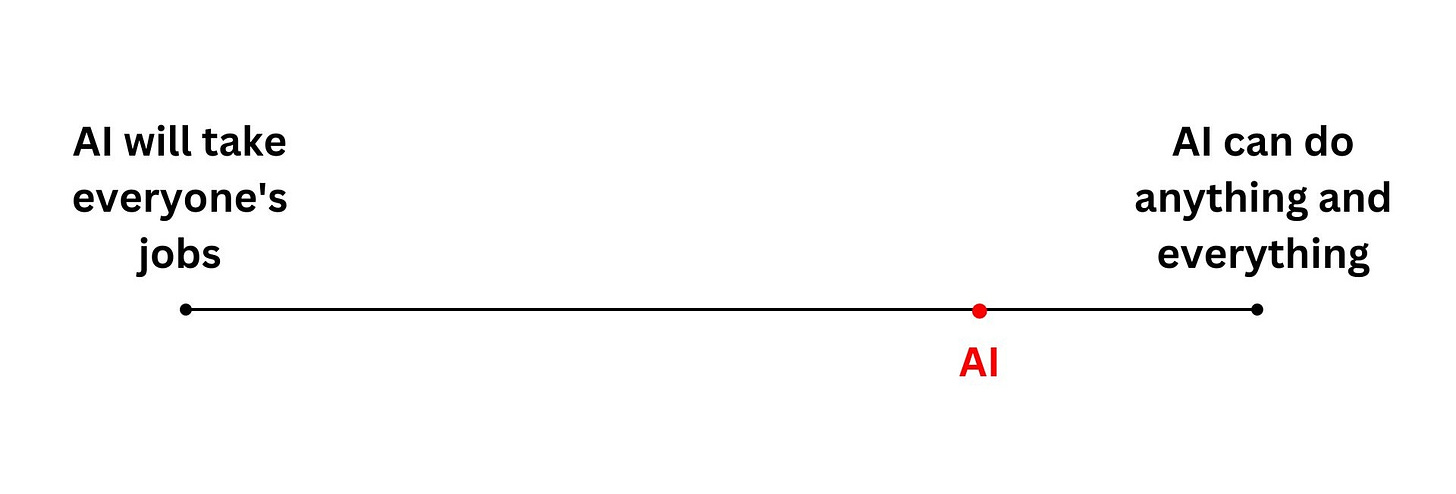Artificial Intelligence: A New Paradigm Emerges
A realistic perspective of the advantages and pitfalls of artificial intelligence
I chose to study computer engineering in college for two reasons: I was good at math and I liked computers. When I chose the major, I didn’t even know what careers were possible. But in early 2017 I was given an opportunity that changed my life forever: my first job. I was hired as a research scientist in the BYU Biomedical Imaging Research Group. This job was crucial, not because it launched my career and taught me about possible career opportunities, but because it blew my mind.
I remember the first topic I became familiar with: image segmentation. First, I learned what it was: the process of manually separating a subject in a medical image. A person would trace out the area of cartilage present in an image. There were 4 types of cartilage so this would be need to be done 4 times per image.
Second, I took a dive into the research the group was doing: machine learning for image segmentation. I had heard about machine learning, but didn’t know much about it at the time. The group had created an algorithm that could segment cartilage automatically. They had done this by feeding the algorithm thousands of manually segmented images as examples.
I thought this was incredible. They had taken a task that takes hundreds of man hours and created an algorithm that could do it in minutes or even seconds. But this wasn’t all. The algorithm wasn’t just faster than a human, its segmentations were actually more accurate. If that wasn’t enough to prove this research, it could achieve that level of speed and accuracy while segmenting all 4 different types of cartilage in one pass.
My mind was blown. I learned a key lesson that day: there’s nothing quite like AI to teach you what you don’t know.
A new paradigm
Each time a new technology emerges every influencer, startup, and tech company find ways to use it and claim it is revolutionary. Some of these technologies are revolutionary (the internet) and others aren’t or still need time (I’m looking at you blockchain— where did you go?). As the next emerging technology, AI is talked up by everyone. Even boomers are talking about ChatGPT. That’s how big of a deal it is.
From what I’ve seen, there seem to be two prominent takes on AI:
It’s going to take everyone’s jobs so we shouldn’t use it.
It can do anything and everything.
While one outlook is negative and one is positive, both are rooted in the undeniably massive impact of AI. In my opinion, neither of these two outlooks are perfect. AI is actually somewhere in the middle as shown below:
AI enthusiasts will be horrified at this take because they feel AI can do anything. While this is theoretically correct, there’s still so much about AI we’re figuring out so I don’t think we can make that claim (take a look at how ChatGPT has regressed as an example). I’ll touch more on this opinion later.

Let’s gain some perspective
The internet had a huge impact on the way we live. Communication is more efficient, processes have turned digital, and everyone lives on the internet. I consider that to be a large paradigm shift. A successful paradigm shift created by AI won’t just be large, it will be massive. Below are a few relatable, more immediate AI projects that show this massive impact on society (and these are just the tip of the AI iceberg).
Self-driving cars
Tesla, right? Well yes, and no. In actuality Waymo, Uber, Cruise, Apple (reportedly), and more are working on this. It’s not about your car driving itself or a specific car brand beating out others because it can drive itself, it’s about every car on the road driving itself. If every driver was perfect do you know what we wouldn’t have anymore? Traffic.
Customer service
This probably sounds awful. My mind immediately goes to the terrible chatbot ‘helpers’ meant to replace a human customer service rep. But this isn’t about replacing human reps it’s about using their time on more complex problems. Conversational AI will be plenty capable of handling the many smaller problems customers call in for. And there won’t be a limit to the number of AI helpers available. This means everyone spends less time on hold.
Medical imaging
I’ve already touched on this above. A more efficient healthcare system is a win for everyone. If you’re interested in this please reach out. I’d love to chat about it. :)
Video games
Do you know that feeling when you finish a game and one of the characters in the game gives the same dialogue every time you try to speak to them? Or the feeling of disappointing because there isn’t more after finishing an excellent game? Both of these: gone. Imagine giving generative AI the reigns to generate gameplay and story elements. This means the potential for a unique game experience for each player and the possibility for stories to continue endlessly.
Second brain
People spend months testing and developing an optimal productivity system to organize their thoughts. Even a successful system requires constant note taking and organizational upkeep. AI could be used to capture, store, and replay information. Imagine never taking notes but the relevant information always being available to you exactly when you need it.
Pitfalls of AI
You already know I’m an AI optimist but I’m not part of the ‘AI can do anything and everything’ crowd. Here are a few pitfalls of AI that keep me from that opinion:
A lot of AI research and development is stochastic (meaning random). While improvements are generally targeted, researchers are always learning more about why improvements are happening. This creates unknowns about how AI will develop. Again, see ChatGPT’s recent developments for an example.
Artificial Intelligence is expensive. Research and development takes a lot of time and money. There will be many applications where AI can be used but won’t be used because of cost. Until this is fixed, AI won’t be doing everything.
Much of the accessibility of AI is reliant on the development of other sciences. Improvements in computer engineering, materials science, physics, and more are necessary to make AI cheaper and more efficient. This limits the spread of AI until progress is made in other areas.
How can you prepare for the AI paradigm shift?
Don’t be afraid of AI. The purpose of AI is to be helpful— not intrusive. Instead of being afraid, focus on points 2 and 3.
Learn how AI works. Use the new AI tools that are coming out. If you understand AI, you’ll know how developments will impact your life and you’ll put yourself into a better position as AI continues to develop.
Keep learning. Even the most renowned AI scientists are learning more about it each day. AI is developing quickly. New applications emerge each day. When you find out about a new use case for AI, play with it to understand how it works.
Use these tools to learn about AI:
ChatGPT: a conversational generative AI created by OpenAI. Ask it questions or just have a chat.
Bard: another conversational generative AI created by Google. It’s always cool to see how this differs from ChatGPT. Try asking them the same questions and see how the answers differ.
Dalle 2: an image generative AI. Try different prompts and see what images it returns. Some of the images in this article were created by Dalle 2.
Connect with me
I love writing, but I love conversing about these topics even more! Connect with me on these platforms so we can chat. :)
I have another newsletter where I write about life lessons and anecdotes I want to pass on to my kids. Feel free to subscribe.
Never hesitate to reach out.
As a thank you for reading to the end, here’s half off a subscription for Society’s Backend forever.






